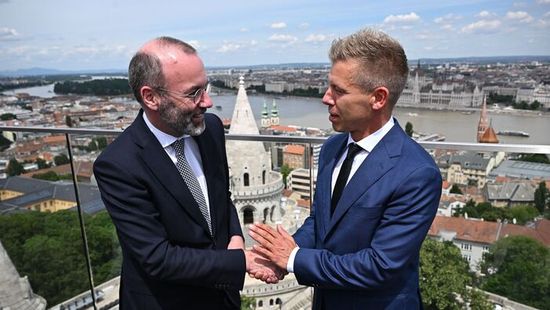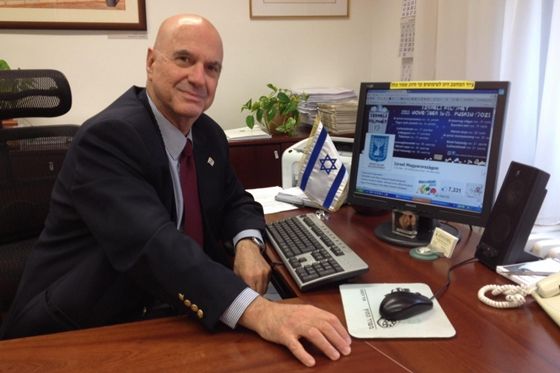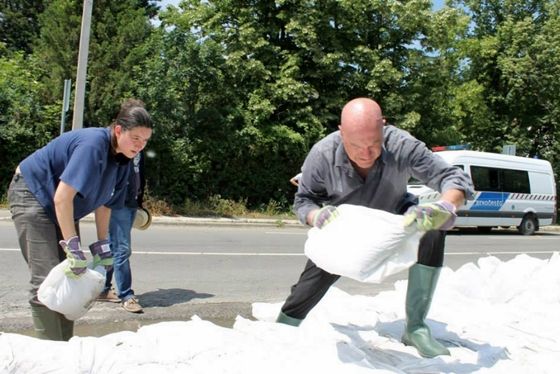Gyurcsánytól tanultak: így jelentené be a Tisza, hogy megszűnik a rezsicsökkentés, elveszik a 13. és 14. havi nyugdíjat

Az elemzők szerint „nem babra megy a játék”, és „elő van készítve az Őszöd 2 is”.

The Israeli-Hungarian relations are special - says Ilan Mor, the Israeli Ambassador to Hungary. According to Mr Mor, it was a good decision from the World Jewish Congress and the Hungarian government, to organize the WJC's conference in Budapest. We have talked with the Ambassador about the conference, the present and the future of the Israeli-Hungarian relations and Israel's current situation in the Middle East.
You have worked in Israel’s Foreign Service for 30 years, serving on four continents. What were the highlights of your career?
Every junior diplomat dreams of becoming an ambassador, who represents his own country and government. Since starting my career, I worked my way up, and it was not easy moving from continent to continent with my wife and children. I served in Germany twice, China, Los Angeles and in Liberia. Finally, I became an ambassador to Hungary and I am happy to serve in this beautiful country. In Europe, I feel like I am at home; in many aspects, Israel has strong ties to Europe – belonging to European culture is part of our identity and heritage.
China and Los Angeles are important for Israel and Israeli society. Does Hungary also have a special importance for Israel?
I like the fact that you used the word "special". Los Angeles is the home of the second biggest Jewish community in the United States. China is China: a leading global power in almost every aspect. We established diplomatic relations with China only in 1992, because prior to that, China traditionally supported the Arab countries. The Israeli-Hungarian relations are special because of the past, the Shoah. After World War II, and after 1956, many Jewish people emigrated from Hungary to Israel, and opened a new chapter in their lives. But they haven't forgotten their Hungarian roots. So there is a special bond in our relations: a unique influence of the past, but aimed to the future. And this is what I am doing here. I use this special bond, and encourage young Hungarians and Israelis to visit each other. For example, in May 2013, the two governments signed an agreement on youth exchanges between the two countries, the first in the history of our diplomatic relations.
You have been representing Israel in Hungary since September 2011. You have been to many places in Hungary, outside Budapest. And what do the young Hungarians know about Israel?
Our embassy's daily activities are oriented to the future. We organize many cultural activities, like film festivals, concerts. I have given lectures to many high school students all around Hungary, from Miskolc to Százhalombatta or Nagykanizsa. I ask the students: “If you hear the word “Israel”, what do you associate it with?” The answers are varied, mainly concentrating on the politics of the Middle East. Most of the students say that Israel is about religion, Judaism, and...war, terrorism, Palestinians. Yes, these are parts of our reality, but the picture is much brighter and much more colorful than this political conflict. That is why I tell them the other, the beautiful, modern aspects of my country.
In an earlier interview you stated that you want to show another Israel to the people.
I want to present Israel from a different point of view. Not the politics, but the society, its culture, science, and technology - which are not that well-known to the majority of the people in Hungary. Let me give you an example: Israel actually is a startup nation. Very few people know that there are 3,500 to 4,000 startups in Israel. This is a success story of a country with very poor natural resources: no water, no oil. Half of the country is desert, while the other half consists of hills. We took these disadvantages and turned them into an advantage. We decided to invest in the people. We invest a lot - not enough! - in education, while four to five percent of the GDP goes to research and development. Hungary and Israel are similar: we both are small countries, we have unique languages and the people are very talented. A great potential for cooperation with Israel is waiting for the Hungarian entrepreneurs. If you know each other, many stereotypes can be dissolved. You can overcome racism, anti-Semitism and other misconceptions. There are some conspiracy theories floating around in Hungary. We are proud of Israel. We defend our country. We are part of the Middle East, and we won’t go anywhere. There are threats from Iran, yes. But we have fought wars and terrorism in the past, and we have overcome them. Anyway, yes, of course there are Israelis coming to Hungary: 55,000 tourists every year, three times more than the number of Hungarians going to Israel, something that I would like to change. Pilgrimage to the Holy Land is more than welcome, but one could also look around in Israel to see a vibrant, pluralistic democracy - not without faults, of course, but the overall picture is very positive.



Ilan Mor at the Danube's flood in Szentendre
An article of the Jerusalem Post in 2012 stated: "Isolated, feeling misunderstood and misrepresented, Hungary is getting a taste of what Israel goes through". How would you react to that?
Sometimes I get this feeling of déja vu. When I hear the news about Hungary's relations with the EU, the USA and neighboring countries, I think that Israel has been in this precare situation for many years. So I can sympathize with the feeling of Hungary being isolated, outcast, fighting for legitimacy, being criticized day and night in the international forum. The conflict in the Middle East, and misperceptions regarding Israel, there are efforts to boycott and sanction Israel. Of course, Hungary is far from this situation, but being attacked, being always on the defensive and trying to explain your position, the context, etc., give me déja vu. Hungary is part of the European Union in a globalized world. There are different opinions, debates within the EU’s 27 member states, but you have an advantage that the Middle East doesn't have: you talk to each other. You never use violence to solve potential differences! In the Middle East, the rules of the game are different.
As long as we’re talking about the Middle East, in one of your earlier interviews you mentioned, "if we really wanted to, we could solve the Israeli-Arab conflict in fifteen minutes." How?
It is symbolic: the conflict could be solved in a very short time. Two states for two nations, living side by side, recognizing each other, respecting each other, and finally they would put the conflict aside, once and for all. All the components of the solution are on the table. We have to sit down and talk. Once we talk, there is a positive dynamic. Ramallah and Jerusalem are just seven minutes away from each other by car. We have to read the Old Testament, the fight between Abraham and Lot for the water. Abraham told Lot, “you go to the right, I go the left, and both of us will have our own territory.” That was the first political compromise in the history. Let us learn from it. Very simple. If everyone is sincere in solving the conflict, the peace is possible. But it takes two to tango, and we in Israel do not see at this point in time a sincere and devoted Palestinian partner who is ready to talk to us without precondition. Israel remains devoted to peace under the principle “to live and let live”.